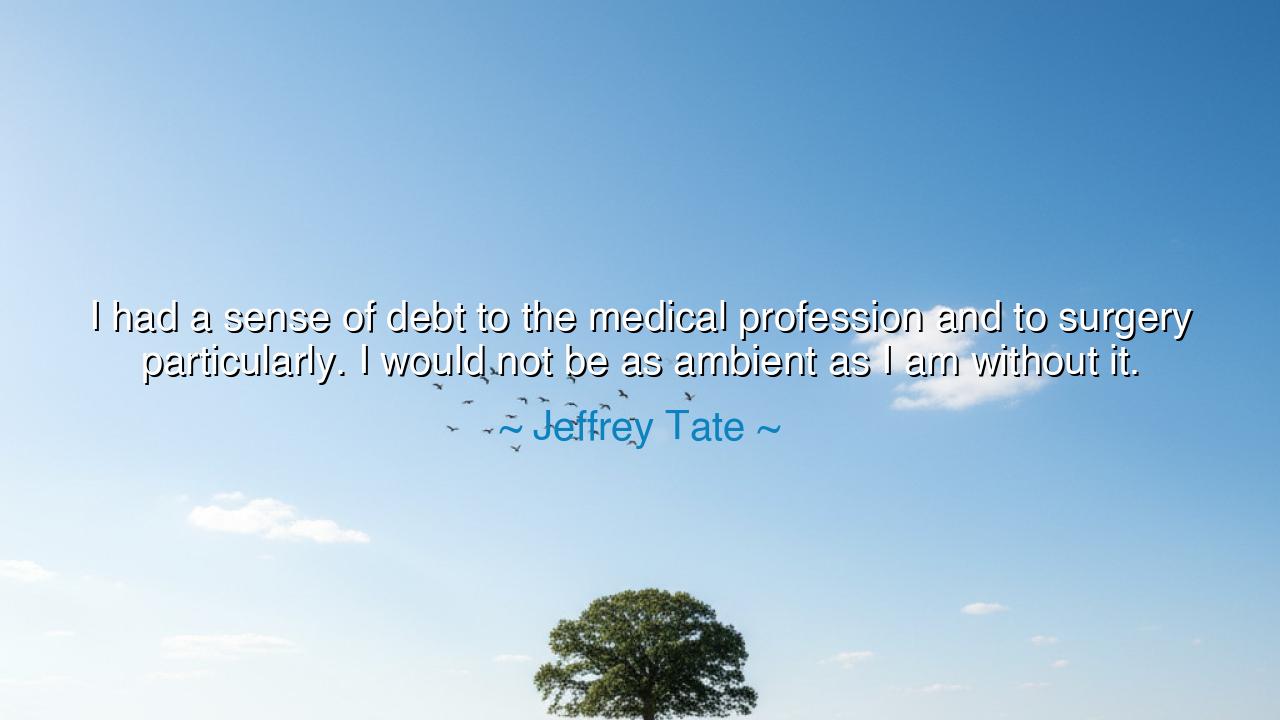
I had a sense of debt to the medical profession and to surgery
I had a sense of debt to the medical profession and to surgery particularly. I would not be as ambient as I am without it.






“I had a sense of debt to the medical profession and to surgery particularly. I would not be as ambient as I am without it.” Thus spoke Jeffrey Tate, the great English conductor, a man whose life was a symphony of triumph over adversity. His words are not simply an expression of gratitude — they are a hymn to the art of healing, a recognition of how science and compassion together can restore the body and liberate the spirit. In his humble confession lies a universal truth: that the healer’s hand not only mends flesh, but rekindles the flame of destiny within the soul.
Born with a spinal condition known as spina bifida, Tate entered the world with pain as his first companion. The physical trials that shaped his youth might have crushed a lesser spirit, but through the grace of medical skill — and the strength of his own will — he rose above what fate had written for him. The surgeons who tended to his frailty did more than save his body; they gave him the ability to move through the world, to conduct music, to live a life illuminated by art. When Tate speaks of owing a “debt” to medicine, he speaks not in metaphor, but in truth. For without the intervention of those devoted to the healing arts, his body would have been his prison, and the great music within him would have remained forever unheard.
His mention of being “ambient” — at ease, mobile, free — carries a meaning far deeper than it first appears. It is not only the freedom of movement, but the freedom of being, the liberation from confinement. Tate’s gratitude is born from understanding what it means to live at the edge of stillness — to have once been constrained by frailty and then given back the grace to move, to act, to breathe without pain. For him, the medical profession was not an abstract institution, but a brotherhood of modern-day alchemists, transforming suffering into possibility. His life became a testament to the sacred covenant between patient and healer, between human fragility and human genius.
In his story, one hears echoes of the ancient physician Hippocrates, who taught that to heal is not merely to cure the body, but to restore balance and harmony to the whole of life. The Greeks saw medicine as both science and sacred duty — a gift from the gods, meant to relieve suffering and return the soul to its proper rhythm. So too did Tate’s healers fulfill this ancient role. They gave him not only years to live, but the rhythm of life itself, so that he could stand before orchestras and bring forth music that transcended pain. In their steady hands and quiet skill, he found his own resurrection.
Throughout history, there have been countless souls who, like Jeffrey Tate, owed their second life to medicine and turned their gratitude into greatness. Consider the story of Frida Kahlo, who, after a terrible accident, endured countless surgeries and unbearable pain. Yet, from that suffering, she painted her truth, her anguish, her beauty. Like Tate, she turned the work of the surgeons into the foundation of her art. Their stories remind us that gratitude is not only spoken in words — it is expressed through creation, through the act of living fully despite all odds.
But Tate’s reflection also carries a deeper lesson about humility. Though celebrated across the world for his musical mastery, he never forgot those who had made his life possible. In this, he teaches us that greatness is not self-made, but sustained by countless unseen hands — the doctors, nurses, and healers who labor not for fame, but for the quiet joy of seeing another life restored. His words remind us to honor those who serve humanity in the most sacred of ways: by giving others the chance to stand, to move, to dream.
So, my children, learn from Jeffrey Tate’s gratitude. Be thankful not only for your blessings, but for the invisible network of care and compassion that makes your life possible. When you walk freely, remember those who made that freedom possible. When you breathe easily, think of those who heal the breath of others. And if ever you are touched by the hand of medicine — by surgery, by science, by mercy — carry your gratitude like a torch, and let it light the lives of others.
For in the end, Tate’s words remind us of a profound truth: to be healed is to be reborn, and to be reborn demands remembrance. Let us, then, live in reverence — for the healers, for the gift of the body, and for the spirit that endures beyond pain. The greatest music we can play is not written in notes, but in the way we live — with gratitude, humility, and love for those who give us the chance to live again.






AAdministratorAdministrator
Welcome, honored guests. Please leave a comment, we will respond soon